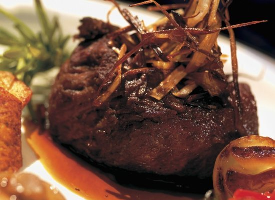12 Myths About Cholesterol

Just heard on TV (so it must be true) that 1/3 of Americans have high cholesterol, so this topic is both timely and important. Do you know your cholesterol numbers? Would be a good idea, as well as learning more about cholesterol right here… read on…
[Update: It’s a world wide problem.] [Update 2: Check out one man’s pursuit of healthy cholesterol numbers.]ONE OF my longest, detailed and perhaps boring post is about dietary fat. I really dug into this topic because people seem to be so confused about the types of fat, and which are “good” or “bad”.
(If you have time to kill, read: Fat is Good…Maybe…Could Be…)
Ever since I wrote that post, I thought I should return to the topic and explain things more simply. But I don’t have to, because Dr. Rebecca S. Reeves has done it already in her succinct article, Heart Health: 12 Myths About Cholesterol, which I summarize below.
“What does cholesterol have to do with fat”, you may ask? “And why should I care”? Well, let’s first define cholesterol… from my “Fat” article, I quote:
“Cholesterol, is one of a class of complex lipids called “sterols“, and comes in two forms: the “bad” form associated with low density lipoproteins (“LDL”), and the “good” form associated with high density lipoproteins (“HDL”).”
Clear as mud, right?
Well, again from my “Fat” article, another attempt:
“Bad fats are saturated fat and trans fat.
Fats containing saturated fatty acids are called Saturated Fats. Examples of foods high in saturated fats include lard, butter, whole milk, cream, eggs, red meat, chocolate, and solid shortenings. Excess intake of saturated fat can raise your blood cholesterol and increase the risk of developing coronary artery disease.”
“Trans Fats are found in vegetable shortenings and in some margarines, crackers, cookies, and snack foods, and will increase the shelf life of oils. But trans fats will not extend your shelf life; rather, just the opposite – consumption of trans fatty acids increases blood LDL-cholesterol (“bad” cholesterol) levels and raises the risk of coronary heart disease. A nice recipe for a short life.”
OK, needed to connect the dots between cholesterol and fat before turning to Dr. Reeves’ article where she sometimes uses the two terms interchangeably.
The 12 Myths About Cholesterol
- Healthy diets eliminate the most fat. Not necessarily – you need fat in your diet, at least 25% of total calories.
- All fats are equal. No, some are good, some OK, some bad. Good are Monosaturated (olive oil, peanut oil, avocado); and Polyunsaturated (salmon, seeds, nuts, vegetable oils). OK is coconut oil, a saturated fat, yes, but with a different chemistry. Bad are Saturated (fatty red meats, butter, palm oil); and Trans fat (anything termed “hydrogenated oils”, typically in packaged foods and fast foods, like French fries.
- Low fat = low calorie. Nope. When the fat is taken out, often other high calorie stuff is put in, like sugar-type stuff. Plus you might wind up eating more of the low fat, high sugar food and thus consume more calories.
- Olive oil has less calories than other oil. All oils have 9 calories per gram.
- No “trans fat” means the food is healthy. Maybe… what replaced it, saturated fat? Just minimize your consumption of manufactured, packaged food.
- Plant “sterols” will reduce cholesterol. Yes, if you eat about 100 pounds of the veggies, fruits and grains each day.
- The food label says, “Contains plant sterols” and this will lower cholesterol. Depends on the amount… you need 0.8 grams of plant sterols per day may reduce your risk of heart disease. Look for the CoroWise logo on the label.
- Plant sterols reduces blood cholesterol by dissolving it in the intestines. Plant sterols work by reducing the absorption of cholesterol from your intestines, which in turn reduces the level of LDL (bad) cholesterol in your body. Cholesterol that is not absorbed is eliminated from your body.
- Plant sterols do not lower cholesterol. Wrong – studies show that plant sterols are effective at lowering LDL cholesterol if you consume between 0.8 and 3 grams per day.
- No plant sterol is need if you have normal cholesterol levels. May not be needed if your LDL number is good, but whether your cholesterol is high or “normal”, plant sterol will lower LDL.
- Children and pregnant women should avoid plant sterols. No, there’s no “should” here… consuming plant sterols for them may be unnecessary since children and pregnant women usually do not have high cholesterol, but doing so is not harmful.
- It’s a good thing to eliminate cholesterol completely from your diet. For most of us, it’s safe to have 300 mg of cholesterol daily, the recommended daily limit.
Well, there you have it. If you have any thoughts or suggestions or experiences to share on the topic, please go to the Comments section below and weigh in.
Last Updated on July 7, 2023 by Joe Garma


